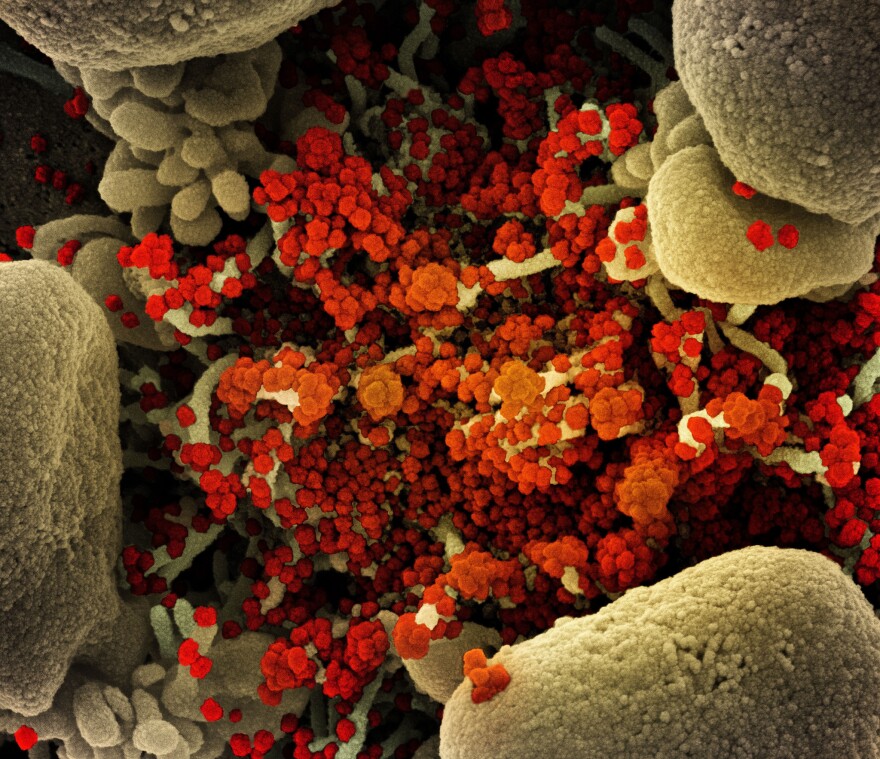Alaska’s publicly-reported cases of COVID-19 have spiked sharply in the past month, and the virus’ rate of spread over the past week puts it among the top 15 states in the country, according to data collected by the New York Times.
But the true number of new positive tests is actually significantly higher than the figures being reported, officials say, because state workers can’t keep up with data entry and the work of validating each case.
The real figures could be 25% to 50% larger than those being reported, or even more than that, said Louisa Castrodale, a state epidemiologist. It’s hard to say, she added, because a big proportion of the backlog could end up being duplicate reports of people whose cases have already been recorded.
“It’s significant -- we’re not missing 10 cases each day,” Castrodale said in a phone interview this week. “It’s not little.”
Read full coverage of the COVID-19 pandemic from Alaska Public Media
Before positive tests are confirmed and added to the list that’s reported each day on Alaska’s COVID-19 dashboard, state workers have to make sure it’s not a case that’s been reported before.
More than a dozen people are tasked with data entry right now, and other department staff help as well, Castrodale said. Part of the work entails cross-referencing data like the names and birth dates associated with each positive test, she added.
The state is trying to make its data entry and validation process more efficient and automated, and it’s currently hiring more people to do the job, Castrodale said. But the backlog is not getting smaller right now, she added, because of the large number of positive tests that the state is currently contending with.
Officials have long cautioned that the publicly reported numbers could be corrected or changed later, and they say it’s better to look at trends over longer periods. Castrodale also said the state’s message of caution wouldn’t change even if its numbers were higher, since they’re already increasing quickly.
“The take-home message is that regardless of the numbers, the numbers are going up. They’re not plateauing,” Castrodale said. “So, that hopefully translates into people thinking, ‘All right, well, I need to take this seriously, and I need to do what I can do to reduce those numbers.“
The backlog in reported new cases is the latest sign that Alaska's recent surge in COVID-19 is exceeding the state’s ability to track and contain the spread. Officials are also reporting that their ability to trace infected people’s contacts -- a key tool in ensuring that detected individual cases don’t expand into bigger outbreaks -- has become increasingly strained.
As coronavirus infections surge across the state, Alaska finds itself at ‘a tipping point’
When Alaska was recording single- or double-digit daily case counts, the health department could keep up with data entry, Castrodale said.
But now, with those daily counts regularly exceeding 400, that’s not happening. At a recent public briefing on the science of COVID-19, Castrodale said there are probably "two or three days of stacks of paper and electronic reports that we can't get to, every day."
Since the start of the pandemic, Alaska’s overall case rate is still lower than more than half of other states, and its death rate is second-lowest, ahead of only Vermont, according to the New York Times data.
But as cases have risen sharply in recent weeks, the backlog in reporting cases is “concerning,” given that Dunleavy’s administration says it looks to data to guide its response to the pandemic, said Bethel Democratic Rep. Tiffany Zulkosky, who chairs the state House’s health committee.
Outside of the Legislature, Zulkosky works as a communications executive for the tribal health-care provider in Bethel, the hub community in Southwest Alaska -- a region where current levels of the virus are among the nation’s highest.
Zulkosky said she thinks the delay in reporting new cases, along with Alaska’s strained contact tracing network, are symptoms of “a virus and a pandemic that is quickly becoming out of control.”
“Clearly, there’s a problem,” she said.


